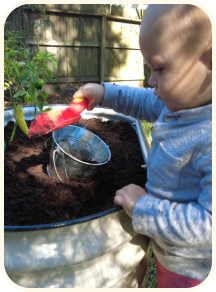16 Time-Saving Tips for Organic Gardeners Using Raised Beds
We all want the lush garden, the fruitful harvests, and the breathtaking views, but not the hard work. We can definitely say "pass" to the hard work.
How about we show you some time-saving tips to help you run a practical garden without investing a lot of time in the thick of things?
The solution lies in the art of efficiency – with a lot of strategy and consistency, you can maximize your garden and minimize the time you spend gardening.
In this blog, we'll explore the benefits of raised bed gardening and reveal 16 time-saving tips that will help you create a thriving oasis in no time!
Benefits of Raised Bed Gardening
Raised garden beds are the unsung heroes of efficient gardening!
They offer benefits, such as better drainage, better soil structure, are ergonomic, cost-effective, reusable and durable, and help with pest control. Raised garden beds offer more control over soil quality, drainage and weeding, so you can spend less time weeding and more time tending to your plants.
Vego Gaden has a wide selection of raised beds in a variety of sizes that are perfect for the outdoors, patio, or even the porch!
16 Time-Saving Tips for Organic Gardeners Using Raised Beds:
1. Strategic Bed Placement
Place your raised bed in areas that receive 6 to 8 hours of consistent sunlight. Most crops thrive in full sun, with occasional exceptions. For crops that need partial shade, use an arch trellis or other crops, especially if you do combination crops.
2. Multifunctional tools
The right gardening tools will speed up your work! Equip yourself with versatile tools like the 10-in-1 Hori Hori Knife to tackle tasks like planting, digging holes and transplanting seedlings. Its versatility will save you time and effort without the hassle of switching tools around, especially if you suffer from "scatterbrain" syndrome and can’t remember where you left your tools half the time!

3.Quick Soil Preparation
A sieve helps sort through old soil to get rid of large roots, rocks, shells and other things you don't need in your soil without removing the good stuff like fertilizer and worm droppings. Having sifted soil handy will help you speed up gardening projects!
4. Practical Storage
Make your life easier by giving your tools a home! Having a toolbox where you keep all your things is a game changer. So is a heavy-duty bag that you can get dirty and use to carry around your harvested crops, tools, weeds, and garden waste.
5. Healthy Seedlings
Seedlings need a perfect environment to thrive; if you don't water them properly, they can die from damping off disease. To avoid damping off disease, your seedling trays must have perfect air circulation and water drainage. Vego Garden Seedling Trays reduce transplant shock and have a unique drainage system that increases the success rate of seedling transplant.

6. Optimal Watering
Set up your raised beds near a water source so you can easily water your garden. There are many watering systems you can use to automate your garden, but they also come with a higher price tag. It all depends on how much you are willing to invest to minimize the work you do in your garden.
Here's a gardening tip for you: The best time to water your plants is early in the morning or in the evening!
The best way to keep intruders out of your raised garden bed is to have a cover system! A cover system protects your plants and, unlike organic pesticides, does not disrupt the pH of the soil or the ecosystem of your raised bed.
8. Nutrient-Boosting Worm Castings
Let the worms in your soil do all the work for you! Locally sourced organic worm castings are a great addition to your soil because it provides nutrients evenly to your plants and reduces the need for frequent fertilizing.
9. Time-Saving Mulching
The goal of using mulch is to prevent weeds from spreading in your garden beds, thus saving you a lot of work. Using straw mulch keeps moisture in the soil and suppresses weeds, minimizing the time spent watering and weeding.
10. Slow-Release Fertilization
Slow-release organic fertilizers provide your soil with nutrients evenly throughout the growing season, saving you time that can be well spent on other gardening chores.
11. Efficient Pruning and Weeding
If you make a habit of removing weeds as you walk through your garden, you'll save yourself an exorbitant amount of work later. Also, regular pruning will help maintain healthy growth, prevent overcrowding and save time for corrective action later.
12. Group Planting
Strategically pair plants that have the same sun and watering needs and can help each other to deter pests, reducing the need for constant vigilance and pest control.
13. Perennial Plants
Perennial plants offer an invaluable time advantage for raised beds!
Unlike annuals, which must be replanted each year, perennials persist permanently, so they do not need to be replanted repeatedly. Once established, they continue to grow and bloom year after year, making them very low maintenance. Their established root system also improves soil structure and water retention, so less frequent watering and soil amendments are needed.

The reason we love raised beds so much is that in them you can use the Hugelkultur method,, which is a game changer in terms of time and maintenance!
In the Hugelkultur method raised beds are filled in a specific order with rotting wood, wood chips, grass clippings, and other organic materials that release nutrients and retain moisture, over time - the perfect combination for a balanced ecosystem in your raised beds that nourishes your soil and produces healthy plants.
15. Add Labels
By clearly marking the identity of each plant, you no longer have to rely on your memory or constantly refer to plant tables! This simple method will save you a lot of time and effort in the long run that you'd otherwise have to spend guessing or researching. Whether you're tending to a diverse collection of vegetables, herbs, or flowers, or planning for next year, plant labels are a clear roadmap that will simplify your gardening efforts and ensure that each plant gets the care it needs without unnecessary guesswork or delays.
16. Low Maintenance Crops
Low-maintenance vegetables may be best for busy gardeners who want to save time! Native plants, perennial crops and root vegetables like carrots and radishes, and hardy greens like kale, spinach and chard require little attention and little money.
Final thoughts
Busy gardeners need a break from hard work!
Making your gardening more efficient doesn't mean you have to sacrifice the beauty and richness of your garden. By following these time-saving tips, you can ensure that your garden only takes up as much time as you're willing to give.The good news is that even the laziest gardeners can have a thriving garden without giving up the best opportunities to make the most of their precious time!





























Leave a comment